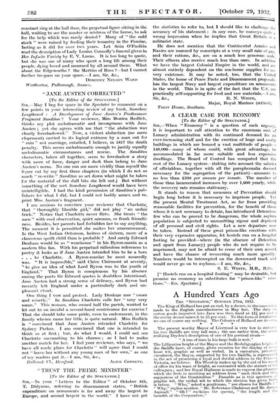A CLEAR CASE FOR ECONOMY
[To the Editor of the SPECTATOR.] SIR,—When " Economy " is a question of such urgency. it is important to call attention to the enormous cost of Lunacy administration with its continued demand for au ever-increasing staff and for the erection of huge and costly buildings in which are housed a vast multitude of people- 146,000—many of whom could, with great advantage, be accommodated in far more suitable and less expensive dwellings. The Board of Control has computed that the cost of the Lunacy system—(taking into account the salaries Of officialdom, together with all the paraphernalia deemed necessary for the segregation of the patient)—amounts to no less than £500 per annum per inmate. The number of those thus incarcerated increases by over 1,600 yearly, white the recovery rate remains stationary.
It stands to reason that measures of Prevention should begin long before it is necessary to imprison people. Yet the present Mental Treatment Act, so far from providing reasonable facilities for prevention, for the benefit of those whom it is not necessary to detain, has introduced Detention. few who can be proved to be dangerous, the whole asylum population is subjected to unremitting rigour and deprived of all personal and civil rights. Let a new departure now be taken. Instead of these great prison-like erections with their very expensive apparatus, let hostels run on a hospital footing be provided—where (in the absence of Detention and apart from Lunacy) people who do not require to be imprisoned, may not be afraid to come of their own accord and have the chance of recovering much more speedily- Numbers would be intercepted on the downward track and would never go on to asylums.—I am, Sir, &e., S. E. WHITE, M.B., B.Sc.
[" Hostels run on a hospital footing" may be desirable, but promise no economy as substitutes for " prison-like " erec- t ions."—Eu. Spectator.]












































 Previous page
Previous page